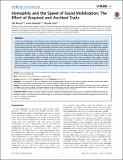Homophily and the Speed of Social Mobilization: The Effect of Acquired and Ascribed Traits
Author(s)
Alstott, Jeff; Madnick, Stuart E.; Velu, Chander
DownloadAlstott-2014-Homophily and the sp.pdf (633.3Kb)
PUBLISHER_CC
Publisher with Creative Commons License
Creative Commons Attribution
Terms of use
Metadata
Show full item recordAbstract
Large-scale mobilization of individuals across social networks is becoming increasingly prevalent in society. However, little is known about what affects the speed of social mobilization. Here we use a framed field experiment to identify and measure properties of individuals and their relationships that predict mobilization speed. We ran a global social mobilization contest and recorded personal traits of the participants and those they recruited. We studied the effects of ascribed traits (gender, age) and acquired traits (geography, and information source) on the speed of mobilization. We found that homophily, a preference for interacting with other individuals with similar traits, had a mixed role in social mobilization. Homophily was present for acquired traits, in which mobilization speed was faster when the recuiter and recruit had the same trait compared to different traits. In contrast, we did not find support for homophily for the ascribed traits. Instead, those traits had other, non-homophily effects: Females mobilized other females faster than males mobilized other males. Younger recruiters mobilized others faster, and older recruits mobilized slower. Recruits also mobilized faster when they first heard about the contest directly from the contest organization, and decreased in speed when hearing from less personal source types (e.g. family vs. media). These findings show that social mobilization includes dynamics that are unlike other, more passive forms of social activity propagation. These findings suggest relevant factors for engineering social mobilization tasks for increased speed.
Date issued
2014-04Department
Massachusetts Institute of Technology. Engineering Systems Division; Sloan School of ManagementJournal
PLoS ONE
Publisher
Public Library of Science
Citation
Alstott, Jeff, Stuart Madnick, and Chander Velu. “Homophily and the Speed of Social Mobilization: The Effect of Acquired and Ascribed Traits.” Edited by Angel Sánchez. PLoS ONE 9, no. 4 (April 16, 2014): e95140.
Version: Final published version
ISSN
1932-6203